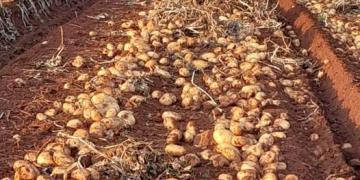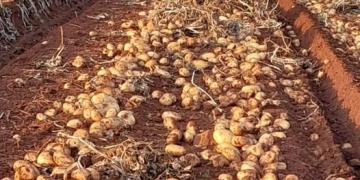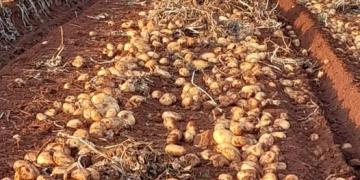Belgica: Turbulent times in the potato sector: What is really going on?
With unilaterally terminated contracts and scaled back contract proposals, the Belgian potato sector is experiencing turbulent times.

From optimism to panic
Where positivism in the Belgian potato chain was still palpable at the end of November during the potato trade fair Interpom in Kortrijk, there is little left of that today. Until 15 February, everything was fine: the free market price of around 300 euros per tonne promised a lot of good for the potatoes that were still in the shed and the contract price for the new season remained stable, but at a high level. That created the necessary eagerness among the potato growers. Many of them decided to grow more potatoes, while new growers also stood up to get their share of the flourishing sector.
The fact that the price of free potatoes suddenly and quite sharply started to fall afterwards was a first sign on the wall. More soon followed: a trader unilaterally scaled back contracts for the new season and a large processor announced that the volumes on contract proposals, which had not yet been signed by both parties, would be reduced. In the meantime, the free market price continued to fall and has almost halved compared to early February.
Dominoes continue to fall
Concerned farmers contacted their agricultural organisations and an emergency meeting was held between the representatives of the farmers and the processors under the umbrella of the trade association Belpotato.be. The joint position was taken that contracts signed by both parties should be respected. Unfortunately, the trader who unilaterally scaled back the contracts was not a member of Belgapom and so the sector federation and the trade association are powerless.
Meanwhile, the dominoes seem to be falling further. After a large Belgian processor and a Belgian trader, a Dutch processor has now also contacted its (Belgian) growers with the request to deliver less. The same for a trader who has written to his contracted growers with the message that there will be a 15 percent cut on the current contracts. And in the corridors there is talk of other traders who have informed growers that their contracts will be scaled back. The initial nervousness seems to have turned into panic in the meantime.
Sputtering trade
What is really going on in the potato market? VILT listened to Christophe Vermeulen, CEO of the sector federation of potato trade and processing Belgapom, to hear what is really going on in the potato industry in our country and whether potato growers should brace themselves for worse.
The potatoes still have to go into the ground. Give us a dry spring and the mood changes immediately
Vermeulen sees changes on both the demand and supply side that underlie the current market situation. First and foremost, the potato processing industry is confronted with a declining sales market for its products. "Trade is spluttering," he says. "Exports to countries outside Europe are under pressure, partly due to the threat from the American president to impose import tariffs on European products. At the same time, we are also seeing increased competition from Asia. In China, for example, they are increasingly focusing on their own production. And we are feeling that." In addition, the Belgian potato sector has recently invested heavily in additional processing capacity. "But just because there is more capacity, it does not mean that the necessary sales markets will automatically follow," says the Belgapom CEO. This combination means that processors are still left with fairly large stocks.
Larger area due to high returns
At the same time, he sees that the booming potato sector of recent years has motivated farmers to plant even more potatoes this spring. Farmers who had never had potatoes in their cultivation plan before also decided to start growing them due to the good returns of recent years. “I hear from my members that the volumes in the contract proposals that the farmers made were generally a lot higher than last year,” says Vermeulen. According to him, the industry is now trying to correct this expected oversupply of potatoes because it simply cannot process and sell everything.
The CEO speaks of a perfect storm in this context. “All these things are coming together and processing is being affected across the board. That means that we as an industry will have to adjust our strategy and that takes time. That is why I also call on everyone to remain calm and keep a cool head so that the industry has the opportunity to do what is necessary,” he explains. According to Vermeulen, all the nervousness and panic is also somewhat premature, because the potato market is particularly volatile. “The potatoes still have to go into the ground. Give us a dry spring and the mood will change immediately.”
Is understanding also mutual?
Vermeulen hopes that the industry can count on the same understanding as she herself had for the growers. “I certainly understand the position of the potato growers. But in the last five years I can list several moments when the trade and processing did everything to get lower harvests, glassy potatoes and potatoes with through-growth processed. Not to mention corona. Then my members did everything they could to fulfill their contracts, even though a large part of their sales disappeared overnight.”
Vermeulen emphasizes that he has asked Belgapom members to act as correctly as possible during this difficult period. "Let me be clear: unilaterally terminating contracts is not possible," he says fiercely. He has nothing against asking growers to understand the difficult situation and to ask them to adjust their contracts now that the potatoes still have to be planted. The same goes for contract proposals to be scaled back by a certain percentage.
“For the sake of clarity, the latter concerns contract proposals that have not yet been signed by both parties. The processor in question could also have applied the principle of ‘first come, first served’, but chose to reduce each contract proposal by the same percentage.” Vermeulen acknowledges that there was a considerable amount of time between returning the contract proposals and signing them. “There is room for improvement. And that will also come about through an adjustment to the code of conduct within Belpotato. But it is the farmers who in the past did not want the code of conduct to include deadlines for contract proposals.”
“Power relations not in balance”
The call for understanding seems to have fallen on deaf ears among the agricultural organisations within Belpotato.be. “It is true that some processors have done their best for the growers in difficult times, but that was certainly not the case for every processor,” says Pieter Van Oost, on behalf of the delegation of agricultural representatives within Belpotato.be, consisting of Boerenbond, ABS, FWA and Fiwap.
According to these organisations, the current practices of some processors and traders are opportunistic. "The reverse would not be accepted by the buyers either", they say. They also note that there is division among processors and buyers about this practice. "In any case, it shows that the power relations in the chain are not in balance. That is precisely why it is important that Belpotato.be exists where these kinds of matters can be discussed", says Van Oost. He is therefore looking to the FPS Economy to take the lead in this and thus ensure that such practices can no longer occur in the future.
Is a turnaround in sight?
How long it will take for the market to stabilize again is still anyone’s guess. "The potato market is a global market. If I could predict the market, I would be filthy rich," Vermeulen emphasizes. The geopolitical shifts and the rise of potato processing in Asia are two new factors that processors have to take into account. "We must not forget that Trump has only been president of the US for two months. We still have four long years ahead of us. It is impossible to say what Uncle Donald will come up with in that time."
It makes it very difficult for processors to anticipate. The fact that the end of globalism seems to be approaching will in any case require the necessary introspection from the potato processing industry. For example, you have Clarebout, which produces as a global player in Belgium and France and from there exports its fries and other processed potato products all over the world. In contrast, there is the model of, for example, McCain, which has its own production facilities in various parts of the world. Agristo also seems to be following the same path, with its own factory in India and plans to build a production site in the United States. The future will show which model holds up best.
Competition from other parts of the world
According to Vermeulen, it is clear that our region, North-West Europe, is one of the most suitable regions for producing potatoes. “If we look at the combination of soil, climate, know-how and the right variety, it is clear that in China they will never be able to produce on one hectare what we can here. But that does not mean that our region is the only one where the potato thrives. In fact, that is the disadvantage: the potato grows well everywhere.” The advantage that our growers still have today, we can also quickly lose in his eyes due to the rise of GMO potatoes in other parts of the world. “In that respect, I expect a lot from the Danish presidency of the European Commission. We too will need new genetic techniques (NGTs) to adapt our potato varieties to the changing climate. We are already losing kilos today due to weather that is too dry and too wet.”
At the same time, our sustainability requirements are playing tricks on European producers, because they are costing the sector a lot of money. “That also means that every kilo of fries is also becoming so many cents more expensive and that can start to play tricks on you on a global market. Of course, good water quality and good soil are important. The system has to be sustainable, but it is something you have to take into account.” In this context, Vermeulen refers to the textile industry. Today, West Flanders is the centre of the potato and vegetable processing industry, but 25 years ago it was the textile capital of the world. Look at what is left of that now. We have to make sure that we do not go down the same path with our potatoes,” he warns.
Fuente: vilt.be




